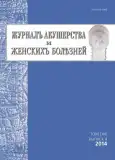In vitro fertilization outcome in women with tubal factor of infertility and previous chlamydial infection
- Authors: Myuller V.S.1, Kogan I.Y.1, Savicheva A.M.1
-
Affiliations:
- D. O. Ott Research Institute of Obstetrics and Gynecology, RAMS
- Issue: Vol 63, No 4 (2014)
- Pages: 54-59
- Section: Articles
- URL: https://journal-vniispk.ru/jowd/article/view/2683
- DOI: https://doi.org/10.17816/JOWD63454-59
- ID: 2683
Cite item
Abstract
Full Text
##article.viewOnOriginalSite##About the authors
Valeriya Sergeyevna Myuller
D. O. Ott Research Institute of Obstetrics and Gynecology, RAMS
Email: valerysamlzh@mail.ru
Igor Yuryevich Kogan
D. O. Ott Research Institute of Obstetrics and Gynecology, RAMS
Email: ikogan@mail.ru
Alevtina Mikhaylovna Savicheva
D. O. Ott Research Institute of Obstetrics and Gynecology, RAMS
Email: savitcheva@mail.ru
References
- Agnani G., Goni J., Aksoy S., el Kaddissi H., Maillet R., Couetdic G., Roux C., Joanne C. Influence of Chlamydiae serology and the presence of a pelvic inflammatory state on the results of in vitro fertilization. Rev Fr Gynecol Obstet. 1991; 86 (4): 327-330.
- Agrawal T., Vats V., Salhan S., Mittal A. Mucosal and peripheral immune responses to chlamydial heat shock proteins in women infected with Chlamydia trachomatis. Clin Exp Immunol. 2007; 148 (3): 461-468.
- Claman P., Amimi M. N., Peeling R. W., Toye B., Jessamine P. Does serologic evidence of remote Chlamydia trachomatis infection and its heat shock protein (CHSP 60) affect in vitro fertilization embryo transfer outcome? Fertil Steril. 1996; 65 (1): 146-149.
- Cortiñas P., Muñoz M. G., Loureiro C. L., Pujol F. H. Follicular fluid antibodies to Chlamydia trachomatis and human heat shock protein-60 kDa and infertility in women Arch Med Res. 2004; 35 (2): 121-125.
- De Punzio C., Metelli P., Masoni S., Ledda R., Olivieri L., Fioretti P., Zolfino I. Isolation of Chlamydia trachomatis during IVF-ET. Acta Eur Fertil. 1991; 22 (4): 213-214.
- Jakus S., Neuer A., Dieterle S., Bongiovanni A. M., Witkin S. S. Antibody to the Chlamydia trachomatis 60 kDa heat shock protein in follicular fluid and in vitro fertilization outcome. Am J Reprod Immunol. 2008; 59 (2): 85-89.
- Keltz М. D., Gera P. S., Moustakis M. Chlamydia serology screening in infertility patients. Fertil Steril. 2006; 85 (3): 752-754.
- Lessing J. B., Kletter Y., Amster R., Amit A., Peyser M. R., Berger S. Success rates in in vitro fertilization treatment and its correlation with high titer antibodies for Chlamydia trachomatis. Isr J Med Sci. 1991;27 (10): 546-549.
- Licciardi F., Grifo J. A., Rosenwaks Z., Witkin S. S. Chlamydia trachomatis and spontaneous abortion following in vitro fertilization. J Assist Reprod Genet. 1992; 9 (3): 207-210.
- Lunenfeld E., Sarov B., Sarov I., Potashnik G., Albotiano S., Shapiro B. S., Decherney A. H., Insler V. Chlamydial IgG and IgA in serum and follicular fluid among patients undergoing in vitro fertilization. Eur J Obstet Gyn Reprod Biol. 1990; 37 (2): 163-173.
- Neuer A., Spandorfer S. D., Giraldo P., Jeremias J., Dieterle S., Korneeva I., Liu H. C., Rosenwaks Z., Witkin S. S. Heat shock protein expression during gametogenesis and embryogenesis. Infect Dis Obstet Gynecol. 1999; 7 (1-2): 10-16.
- Nyboe Andersen A., Carlsen E., Loft A. Trends in the use of intracytoplasmatic sperm injection marked variability between countries. Hum Reprod Update. 2008; 4 (6): 593-604.
- Patton D. L., Askienazy-Elbhar M., Henry-Suchet J., Campbell L. A., Cappuccio A., Tannous W., Wang S. P., Kuo C. C. Detection of Chlamydia trachomatis in fallopian tube tissue in women with postinfectious tubal infertility. Am J Obstet Gynecol. 1994; 171 (1): 95-101.
- Peek J. C., Graham F. M., Hookham А. Prevalence of chlamydial antibodies in women with tubal disease: impact of Chlamydia trachomatis on the demand for in vitro fertilization. N Z Med J. 1990; 103 (84): 63-65.
- Pospísil L., Canderle J., Stroblová H., Unzeitig V, Huser M. Evidence of antibodies against the chlamydial heat shock protein (cHSP60) in women from «in vitro» fertilization program. Ceska Gynekol. 2004; 69 (4): 253-257.
- Rowland G. F., Forsey T., Moss T. R., Steptoe P. C., Hewitt J, Darougar S. Failure of in vitro fertilization and embryo replacement following infection with Chlamydia trachomatis. J In Vitro Fert Embryo Transf. 1985; 2 (3): 151-155.
- Sharara F. I., Queenan J. T. Jr., Springer R. S., Marut E. L., Scoccia B., Scommegna A. Elevated serum Chlamydia trachomatis IgG antibodies. What do they mean for IVF pregnancy rates and loss? J Reprod Med. 1997; 42 (5): 281-286.
- Spandorfer S. D., Neuer A., LaVerda D., Byrne G., Liu H. C., Rosenwaks Z., Witkin S. S. Previously undetected Chlamydia trachomatis infection, immunity to heat shock proteins and tubal occlusion in women undergoing in-vitro fertilization. Hum Reprod. 1999; 14 (1): 60-64.
- Torode H. W., Wheeler P. A., Saunders D. M., McPetrie R. A., Medcalf S. C., Ackerman V. P. The role of chlamydial antibodies in an in vitro fertilization program. Fertil Steril. 1987; 48 (6): 987-990.
- Vardhana P. V., Sprandorfer S. D., Vardhana S., Rosenwaks Z., Witkin S. S. Association between tubal infertility, antibodies to Chlamydia trachomatis and the Chlamydia 60kDa heat shock protein (HSP) and a mannose binding lectin (MBL) gene polymorphism in women undergoing IVF. Fertil Steril. 2004; 82 (2): 526 (S. 321).
Supplementary files







